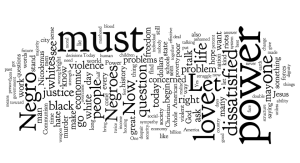
It was a startling statement: “Everyone needs a nigger Jim,” said Damali Ayo, speaker at Urban’s Martin Luther King, Jr. assembly.
Ayo led one of the many discussions and workshops around diversity during Urban’s January Month of Understanding. This year, the month focused on “making the invisible visible.”
Ayo, who attended Sidwell Friends School in Washington, D.C., which she described as similar to Urban, came to talk about solving racism. She outlined five steps for white people (“Admit It, Listen, Educate Yourself, Broaden Your Experience, Take Action”) and five steps for people of color (“Get Real, Speak Out, Educate Yourself, Build Ties, Take Care”).
Ayo talked about the need for education around the achievements of people of color. Ayo quoted Japanese human rights activist Yuri Kochiyama, who said, “as long as we don’t know our history and others’ history, there will be no positive interactions or understanding.”
This need to recognize and discuss history in school connected to another discussion during the Month of Understanding. Library Leaders, a group that meets once a week to work on increasing the use of the school’s library resources, organized a discussion on Jan. 13 about a publisher’s plan to come out with a new edition of Huckleberry Finn that eliminates the words “nigger” and “injun.”
The edition, to be published in February, omits 219 uses of the ‘n’ word replacing it with the word, “slave.” Similarly, “Indian” replaces “injun.”
Urban students and teachers talked about the value of retaining and eliminating the ‘n’ word. Dean of Faculty and English teacher Jonathan Howland said, “no one is reading (Huckleberry Finn) anymore because it is just too charged.”
He added that “even without the ‘n’ word, the book has a lot going on.” The book contains essential topics about America’s history and the increased accessibility that a revised version would provide could have a positive impact.
Yet, opponents see the changes as a cover-up. Virgil Taylor (’11) said, “the problem is that schools and families are worried about confronting our history.” Taking out the ‘n’ word is a “useless Band-Aid” for American history.
Blanca Gutierrez (’11) recalled how her middle school teacher “ripped out the intense scenes from Kaffir Boy.” Gutierrez said “kids flipped out.” For her, “it is important for people to know the real history.” Gutierrez re-read Kaffir Boy at Urban. “I am glad that I was able to read the entire book because it showed the reality of many people and what they had to go through during the late 1940s,” she said.
Ayo herself prompted some debate among Urban faculty and students with her choice to use swear words during her presentation. “Some faculty have already come to me to comment on the f-bombs,” said Ken Garcia-Gonzalez, dean of multicultural life. “But this (presentation) was for the students.”
Ayo said swear words are “part of the performance. In some schools it’s won over the student body, (and) allowed them to trust me.” For Ayo, “the choice of a word like ‘bitches’ is deliberate for its humorous impact. I don’t talk like that in my day-to-day life at all.”
“As I said point-blank in the talk, I might do or say things that upset you, but don’t throw out the entire message because of that,” Ayo said. “That’s an easy way out. If you focus on my language, then you’re just finding a way not to focus on your community.”

